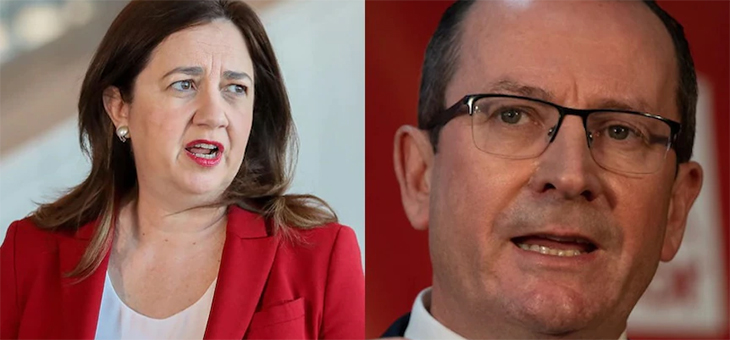The sluggish vaccination rollout in non-COVID states such as Western Australia and Queensland – and both states’ resistance to exposing their population to the virus – means they are missing out on the “maximum protection period” from the vaccines, leading experts say.
As Victoria and New South Wales push past the 70 and 80 per cent double-dose mark for 16-year-olds and above and open up, the COVID-free states of Queensland and Western Australia have been lagging, sitting at 57 per cent and 56 per cent double-dose rates respectively.
Experts say research showing a waning efficacy of the Pfizer and AstraZeneca vaccines means a slower rollout could equate to more circulation of the virus when the states eventually open up, putting the vulnerable at risk.
Deakin University chair of epidemiology Catherine Bennett told the ABC the first couple of months after vaccination was the “maximum protection period” and the population was “less likely” to pass on the virus.
“In the short term, the vaccines work particularly well,” Professor Bennett said
“So this is the advantage of taking the maximum benefit from the vaccines in those first couple of months after most people get their second dose, as we’ve seen in NSW and [now] Victoria, to actually ease restrictions because that should help us not get the big surge [during the] necessary part of opening up.”
NSW, which is sitting at 92.5 per cent for first dose vaccinations, has so far avoided a big surge in case numbers as it lifts further restrictions, but experts suggest it is inevitable. Victoria, which has a higher daily case load, is set to open up tomorrow.
This week Queensland announced it would scrap its hard border – and effectively expose its population to COVID – from December 17, but WA is yet to commit to a date to bring down its hard border to states with COVID infections, despite pressure from business groups.
WA Premier Mark McGowan said on Tuesday WA would reopen to Victoria and NSW sometime next year, when between 80 and 90 per cent of West Australians aged 12 and over were fully vaccinated.
The WA government was contacted for comment.
WA, which yesterday mandated vaccination across a range of workplaces, is on track to reach 80 per cent double-dose vaccination in early December for people aged 16 and over.
‘Fear’ a factor
Professor Bennett said it was understandable states such as WA and Queensland were experiencing slower rollouts as both states had not had a significant outbreak as an impetus to get the vaccine.
“If they’re wading through disinformation and they don’t have the pressure of the virus story – and the government message isn’t clear about when you’re opening – then you do, you have a slower rollout,” she said.
“[And] that doesn’t serve you as well in terms of maximising that period [of peak protection].”
Tony Cunningham, a virologist and vaccine expert from Sydney’s Westmead Institute, said fear played a big factor in pushing up the vaccine rates in Sydney and Melbourne.
“In New South Wales it took one week to get from 70 per cent to 80 per cent double dose,” he said.
“And in some areas of south-west Sydney, we’ve seen above 95 per cent vaccine coverage, which is just extraordinary.
“It’s an unfortunate fact that when the population sees people dying around them – just like we saw with HIV – you very quickly start to see that population practice prevention.”
Speedy rollout a key
States such as WA and Queensland suffered from a lack of vaccines early in the rollout, with New South Wales’ inoculation push – and later Victoria’s – prioritised by the federal government to get both states out of lockdown.
But both states’ populations have been accused of complacency with the rollout, with reports of vaccine appointments sitting idle.
Kirby Institute epidemiologist and infectious diseases expert Raina MacIntyre said a speedy rollout was critical for the non-COVID states.
“You never know when an outbreak is going to occur that can upend everything,” Professor MacIntyre said.
“They need to vaccinate everyone as soon as possible.”
Queensland-based infectious diseases expert and vaccine researcher Paul Griffin said his home state had been a victim of its own success.
He said the most recent studies of the Pfizer and AstraZeneca vaccines showed the vaccines were still highly effective in protecting people from hospitalisation and death.
But, he said, although studies varied on how severe the drop off was, it was “clear” both vaccines’ ability to protect populations from contracting COVID-19 reduced over time.
“But the focus has to be getting everyone their first dose right now, and I do hope we can push that level up quickly in states like Queensland,” he said.
“But this drop-off in efficacy is also why we’re having this discussion around booster shots.”
Boosters the next step
According to Professor Cunningham, getting to 90 per cent or above should still be the main priority for all jurisdictions to reduce the circulation of the virus.
He said ideally states would get there quickly.
However, he said the main risk for states such as WA, where the vaccine rollout had been slow, was the protection of the vulnerable, such as the immunocompromised and the elderly.
“And my professional recommendation is booster shots for the ageing after six months, and for the immunocompromised after three months,” he said.
The Australian Technical Advisory Group on Immunisation (ATAGI) has so far recommended a third dose of a COVID-19 vaccine only for people who are “severely” immunocompromised.
It means about 500,000 people would be eligible for a third dose under ATAGI’s advice.
The federal government is yet to commit to date for booster shots for the elderly or other vulnerable communities, but yesterday indicated it would like the rollout in aged care to start next month.
 © 2020 Australian Broadcasting Corporation. All rights reserved.
© 2020 Australian Broadcasting Corporation. All rights reserved.
ABC Content Disclaimer

